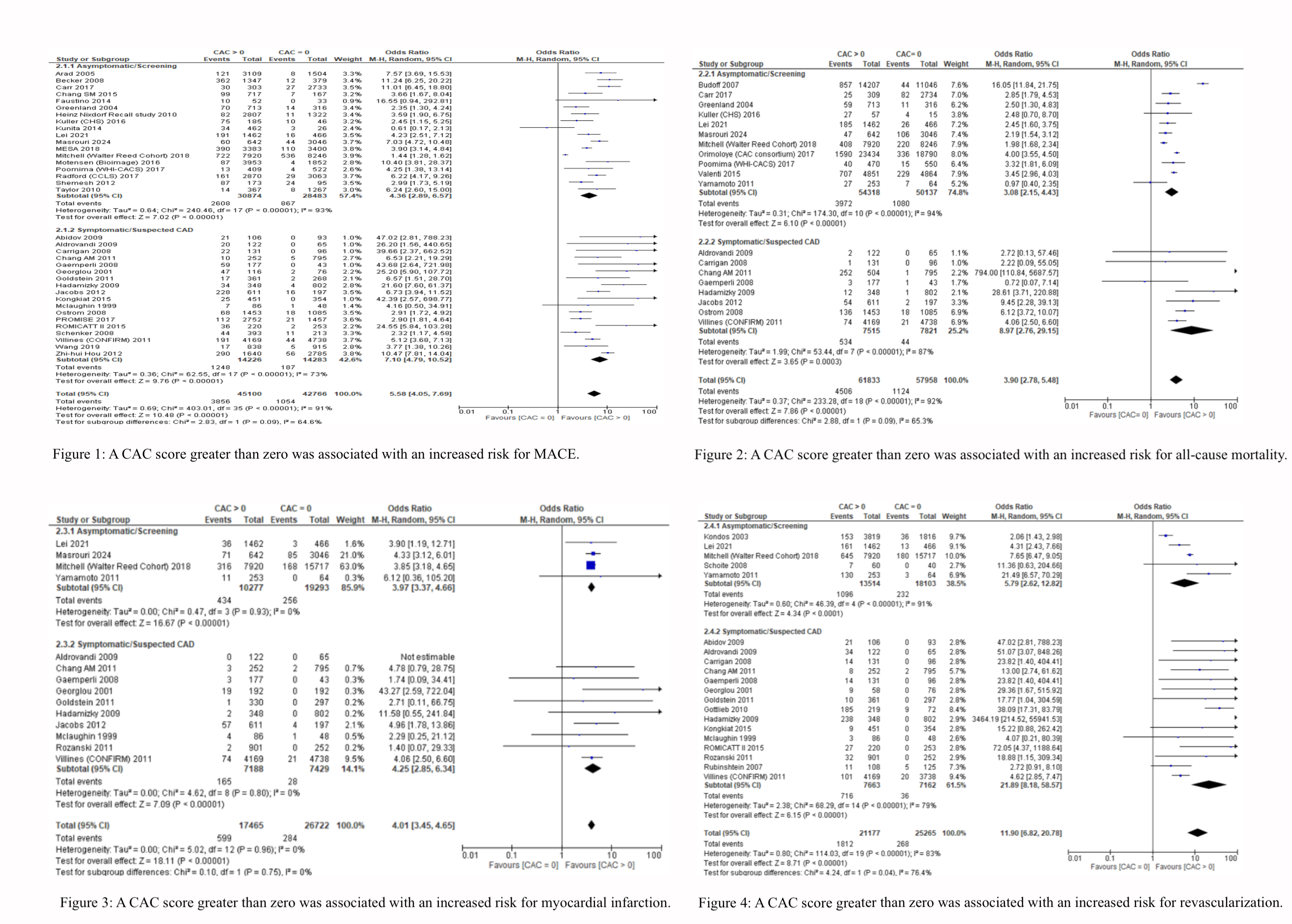Final ID: MDP704
Impact of Coronary Artery Calcium Scores on Cardiovascular Risk and Preventive Therapies: A Systematic Review and Meta-Analysis
Abstract Body (Do not enter title and authors here): Introduction: Coronary artery calcium (CAC) serves as a key marker of atherosclerosis and is widely utilized in the noninvasive evaluation of coronary artery disease. We aim to compare cardiovascular risk outcomes and the likelihood of initiating or continuing pharmacological and lifestyle preventive therapies in asymptomatic and symptomatic patients with a CAC score greater than zero and those with a CAC score of zero with no established diagnosis of coronary artery disease. Methods: We performed systematic searches of PubMed, Scopus, Google Scholar, Cochrane Central, and ClinicalTrials.gov from inception to May 2024. Our search focused on randomized controlled trials and observational studies comparing outcomes between patients with a CAC score greater than zero and those with a CAC score of zero. Results: We included 53 observational studies, incorporating data from 210,672 asymptomatic and 32,477 symptomatic patients. Over a mean follow-up duration of 8.6 years, we observed that a CAC score greater than zero significantly correlated with an elevated risk of major adverse cardiovascular events (MACE) (OR: 5.58; 95% CI: 4.05–7.69; P < 0.00001). This association extended to all-cause mortality (OR: 3.90; 95% CI: 2.78–5.48; P < 0.00001), myocardial infarction (OR: 4.01; 95% CI: 3.45–4.65; P < 0.00001), and the need for revascularization (OR: 11.90; 95% CI: 6.82–20.78; P < 0.00001). Patients with a CAC score greater than zero were more likely to commence and continue aspirin therapy (OR: 2.45; 95% CI: 1.56–3.83; P < 0.0001 for initiation and OR: 1.71; 95% CI: 1.31–2.23; P < 0.0001 for continuation). Similar trends were noted for lipid-lowering medications (OR: 2.44; 95% CI: 1.57–3.79; P < 0.0001 for initiation and OR: 2.48; 95% CI: 1.53–4.01; P = 0.0002 for continuation), as well as the initiation of blood pressure medications (OR: 1.94; 95% CI: 1.61–2.33; P < 0.00001). Furthermore, a CAC score greater than zero was linked to increased adoption of lifestyle modifications, including enhanced physical activity (OR: 1.84; 95% CI: 1.41–2.41; P < 0.00001) and dietary changes (OR: 1.94; 95% CI: 1.52–2.49; P < 0.00001). Conclusion: Patients with elevated CAC scores are more likely to initiate and continue preventive pharmacological therapies and adopt beneficial lifestyle modifications. These findings underscore the importance of CAC scoring in guiding the management and prevention of cardiovascular disease in both asymptomatic and symptomatic populations.
More abstracts on this topic:
Acetylation of mitochondrial LCAD and SOD2 promotes metabolic dysfunction, oxidative stress, multi-organ damage and hypertension
Dikalov Sergey, Nogueira Marina, Polosukhin Vasiliy, Gius David, Milne Ginger, Dikalova Anna
Angiotensin Converting Enzyme Gene Polymorphisms (ACE-I/D) Do Not Predict Exercise-Induced Cardiac Remodeling or Performance in Adolescent Male AthletesBecker Kristian, Hardie William, Gubanich Paul, Hill Garick, Logan Kelsey, Martin Lisa, Powell Adam

